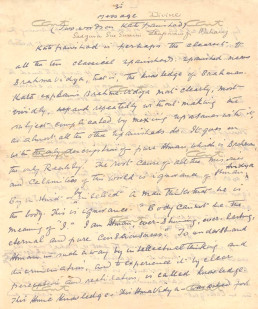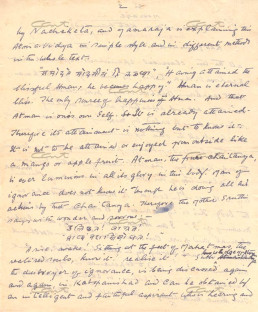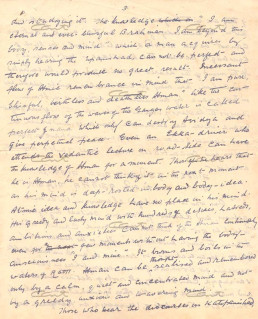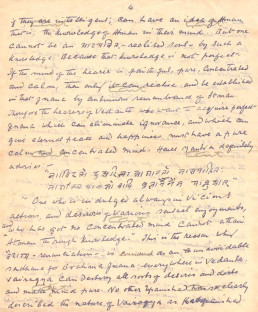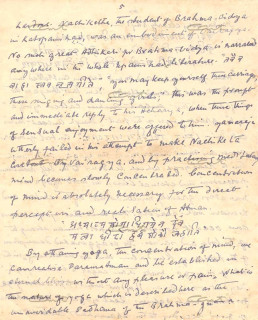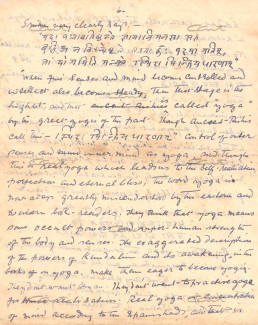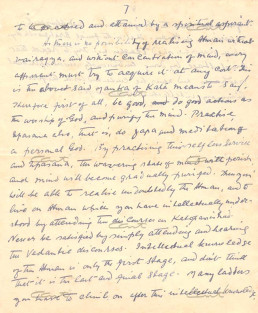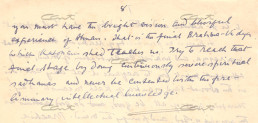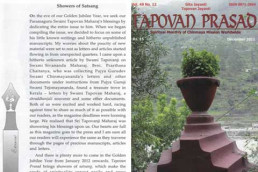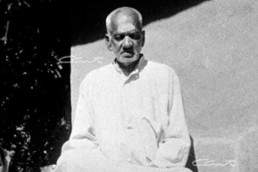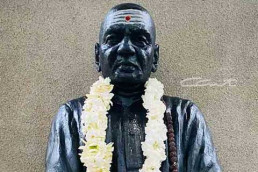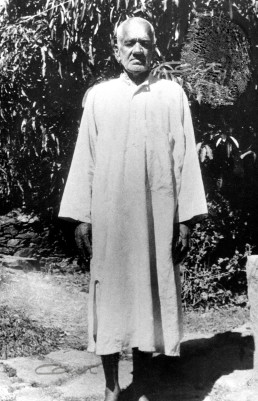
By Swami Tapovanam
The eight-page message below was sent by Swami Tapovan Maharaj to our Pujya Gurudev, Swami Chinmayananda, on the occasion of his jnana yajna on Kathopanishad which was held in Delhi from September 26 to November 26, 1954. It can be seen clearly that the word ‘Divine’ in the title of the Message and the writer’s name below it – ‘Sadguru Sree Swami Thapovanji Maharaj’ – have been added by Pujya Gurudev in black ink.
This message in print form is included in the beginning of the Kathopanishad book published by Central Chinmaya Mission Trust. Our thanks to Smt. Leela Nambiar for giving us permission to reproduce this content here.
Message Divine: Two words on Kathopanishad
Swami Tapovan Maharaj
Kathopanishad is perhaps the clearest of all the ten classical Upanishads. Upanishad means Brahma Vidya, that is, the knowledge of Brahman. Katha explains Brahma Vidya most clearly, most vividly, and repeatedly without making the subject complicated by mixing upasanas with it as almost all the other Upanishads do. It goes on with only the descriptions of the pure Atman, which is Brahman, the only Reality. The root cause of all the miseries and calamities of this world is ignorance of Atman — avidya. By instinct or by intellect a man thinks that he is the body. This is ignorance. “Body cannot be the meaning of ‘I’. I am Atman – ever-shining, ever-lasting, eternal, pure Consciousness.” To understand Atman in such a way by intellectual thinking and discrimination, and to experience it by clear perception and realisation, is called knowledge. This Atmic Knowledge – this Atma Vidya – is asked for by Nachiketa, and Yamaraja explains it in a simple style with different methods in the whole text.
स मोदते मोदनीयँ हि लब्ध्वा
sa modate modanīyam̐ hi labdhvā
Having attained the blissful Atman, he becomes happy.1
Atman is eternal bliss. The only source of happiness is Atman. And that Atman is one’s own Self. It is already attained. Therefore, its attainment is nothing but to know it. It is not to be attained or enjoyed from outside as an object, like a mango or an apple fruit. Atman, the pure chaitanya, is ever-luminous in all its glory in this body. A man of ignorance does not know it, though he is doing all his actions by that chaitanya, Therefore, Mother Sruthi says with wonder and sorrow:
उत्तिष्ठत जाग्रत प्राप्य वरान्निबोधत ।
uttiṣṭhata jāgrata prāpya varānnibodhata |
Arise, Awake! Sitting at the feet of Mahatmas, the realised souls, know it! Realise it!2
Such knowledge of Atman, the destroyer of ignorance, is being discussed again and again in the Kathopanishad and can be obtained by an intelligent and faithful aspirant who is hearing and studying it. The knowledge “I am eternal and ever-blissful Brahman. I am beyond this body, senses and mind” which a man acquires by simply hearing the Upanishad, cannot be perfect, and therefore, would produce no great result. Incessant flow of Atmic remembrance in the mind that “I am the pure, blissful, birthless and deathless Atman,” like the continuous flow of the waves of Ganges water is called perfect jnana which alone can destroy avidya and give perpetual peace. Even an ekka-driver who attends a Vedantic lecture on the roadside can have the knowledge of Atman for a moment. Though he hears that he is Atman, he cannot think of it in the next moment, as his mind is deep-rooted in the body and body-idea. Atmic idea and knowledge have no place in his mind. His greedy and lustful mind with hundreds of desires, hatreds, ambitions and anxieties cannot think of the Atman continuously even for a few moments without having the body-consciousness, “I and mine”. It burns and boils in the waters of trishna3. Atman can be thought of, realised and remembered only by a calm, quiet and concentrated mind and not by a greedy, anxious and wavering mind.
If those who hear the discourses on the Kathopanishad are intelligent, they can have an idea of Atman, that is, the knowledge of Atman in their mind. But one cannot be an atmavit — a realised soul – by such a knowledge, because that knowledge is not perfect. If the mind of the hearer is faithful, pure, concentrated and calm, then only it can realise and get established in that jnana by continuous remembrance of the Atman. Therefore, the hearers of Vedanta who want to acquire perfect jnana, which can eliminate ignorance and which can give eternal peace and happiness, must have a pure, calm and concentrated mind. Hence the Mantra definitely advises:
नाविरतो दुश्चरितान्नाशान्तो नासमाहितः ।
नाशान्तमानसो वापि प्रज्ञानेनैनमाप्नुयात् ॥
nāvirato duścaritānnāśānto nāsamāhitaḥ |
nāśāntamānaso vāpi prajñānenainamāpnuyāt ||
One who is indulged always in vicious actions, and desirous of various sensual enjoyments, and who has got no concentrated mind cannot attain Atman through knowledge.4
This is the reason why vairagya – renunciation — is considered as an unavoidable sadhana for Brahma Jnana everywhere in Vedanta. Vairagya can destroy all sorts of desires and dirt and make the mind pure. No other Upanishad has so clearly described the nature of vairagya as Kathopanisad has done. Nachiketa, the student of Brahma Vidya in Kathopanishad, was an embodiment of vairagya. No such great adhikari for Brahma Vidya is narrated anywhere in the whole Upanishad literature.
तवैव वाहास्तव नृत्यगीते ॥
tavaiva vāhāstava nṛtyagīte ||
You may keep yourself these carriages, these singing and dancing girls.5
This was the prompt and immediate reply to his Acharya, when these things of sensual enjoyment were offered to him. Yamaraja utterly failed in his attempt to make Nachiketa covetous. By vairagya, and by practising meditation, mind becomes slowly concentrated. Concentration of mind is absolutely necessary for the direct perception and realisation of Atman.
अध्यात्मयोगाधिगमेन देवं मत्वा धीरो हर्षशोकौ जहाति ॥
adhyātmayogādhigamena devaṃ matvā dhīro harṣaśokau jahāti |
By attaining Yoga, the concentration of mind, one can realise Paramatma and be established in eternal bliss without any pleasure or pain. 6
What is the nature of the yoga which is described here as the unavoidable sadhana for the Brahma Jnana? Sruthi very clearly says:
यदा पञ्चावतिष्ठन्ते ज्ञानानि मनसा सह ।
बुद्धिश्च न विचेष्टते तामाहुः परमां गतिम् ॥
yadā pañcāvatiṣṭhante jñānāni manasā saha |
buddhiśca na viceṣṭate tāmāhuḥ paramāṃ gatim ||
When the senses and mind become controlled and the intellect also becomes steady, then that stage is the highest, and that is called ‘yoga’ by the great yogis of the past.7
Though ancient Rishis call this sthiramindriyadharanam– control of outer senses and inner mind – as yoga, and though this is real yoga which leads us to Self-realisation, perfection and eternal bliss, the word yoga is now-a-days greatly misunderstood by the Eastern and the Western book-readers. They think that Yoga means some occult powers and super-human strength of the body and senses. The exaggerated descriptions of the power of Kundalini and its awakening in the books on yoga, make them eager to become yogis. They don’t want Atman. They don’t want to practise yoga for Atmic realisation. Real Yoga is concentration of mind, according to the Upanishads, and that is to be practised and attained by a spiritual aspirant.
As there is no possibility of realising the Atman without vairagya, and without concentration of mind, every aspirant must try to acquire it at any cost. This is what the above mantra in Kathopanishad means to say. Therefore, first of all, be good, do good actions as the worship of God, and purify the mind. Practise upasana also, that is, do japa and meditation on a personal God. By practising this selfless service and upasana, the wavering state of mind will perish, and mind will become gradually purified. Then you will be able to realise undoubtedly the Atman, and to live as Atman, which you have intellectually understood by attending the discourses on Kathopanishad.
Never be satisfied by simply attending and hearing the Vedantic discourses. Intellectual knowledge of the Atman is only the first stage; don’t think that it is the last and the final stage. Many ladders you have to climb on after the acquisition of this intellectual knowledge, if you must have the bright vision and the blissful experience of Atman. That is the final Brahma Vidya which the Kathopanishad teaches us. Try to reach that final stage by doing continuously severe spiritual sadhanas and never be contented with the preliminary intellectual knowledge.
1 Kathopanishad, 1.2.13
2 Kathopanishad, 1.3.14
3 Thirst for things
4 Kathopanishad, 1.2.24
5 Kathopanishad, 1.2.26
6 Kathopanishad, 1.2.12
7 Kathopanishad, 2.3.10
Previous Topic
Editors Note – Dec 2011
On the eve of our Golden Jubilee Year, we seek our Paramaguru Swami Tapovan Maharaj's blessings by dedicating the entire…
Next Topic
Mandukya Upanishad
Swami Tapovan Maharaj sent this message to our Pujya Gurudev, Swami Chinmayananda, on the occasion of his Jnana Yajna on the…
Home Page
Homage to Sri Swami Tapovanam
The 50th anniversary edition of Tapovan Prasad (December 2011) was entirely dedicated to our Paramaguru Swami Tapovan…
